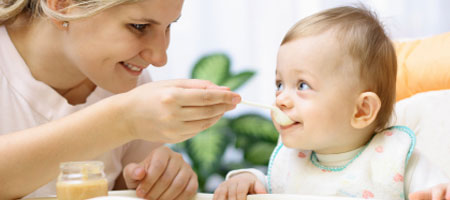Healthy Eating for Babies
Simple and practical tips on what your baby needs to eat to stay healthy.

Babies grow at a fantastic rate‚ they will triple their weight in the first six months and double their length! It's no wonder babies need plenty of feeding in the early days. Every baby starts off with milk.
Breast milk is the best milk for babies as it is perfectly balanced to give your baby everything he or she needs, right from the start. Breast milk is a natural product, easy to digest, and contains all the ingredients that your baby needs to grow and develop. It is ingenious also, adapting to the baby's changing needs, day by day, providing the perfect nutritional mix.
Breast milk also protects: the milk comes directly from your body, and is untouched by human hands – so potential bacterial infection is greatly reduced. Antibodies transferred by the mother, through the milk, provide further protection. There is less chance of your baby developing gastroenteritis, chest infections and diabetes. However breastfeeding is not always possible for everyone and there are several formula milks available for mums who are bottle feeding.
Breastfeeding is not always possible for everyone and there are several formula milks available for mums who are bottle feeding.
Before you decide on how you are going to feed your baby do have a chat with mums who have breastfed and bottle fed and talk to your public health nurse, GP or Dietitian.
Get plenty of good advice and make the best decision for you and your baby. If you are not sure you can always start breastfeeding and move to a bottle later on.
It is very difficult to go from bottle feeding to breastfeeding so always try the breast first! Do remember that the decision of how to feed your baby‚ breast or bottle‚ is yours alone and you must choose the method you feel is best for your baby and that you are most comfortable with.
Remember ‚ if you choose to bottle feed your baby you must always use a proper baby formula ‚never cow‚' s milk. Cow's milk (or goat's, sheep's) is not suitable for babies and can make them quite ill. Make sure you use a formula milk that is specially designed to meet the needs of human babies!
How much milk does my baby need?
Parents often worry about how much milk their baby should be drinking ‚ especially when they are breastfeeding and have no idea how much milk their baby is drinking. The temptation is always to compare your baby with someone else's and while this can be useful you have to remember that the amount of milk a baby needs varies from baby to baby.
Some babies will feed more often than others and all these differences are normal. As long as your baby is gaining weight steadily, there is no need to worry about how much they are taking. On average, a baby will gain between 4 and 6oz (100-150g) per week. If you are worried about your baby's weight, you can have their weight checked at your GP clinic or local health centre.
How long should my baby take breast or formula milk?
Babies need breast or formula milk for at least one year but they should start taking some solid foods from 4-6 months. It is recommended that you breastfeed for the first six months and then start to introduce solid foods.
Babies who are bottle fed may need to start on solid foods around 4 months. Remember‚ never give your baby any solid foods before 4 months either in their bottles or separately‚ their digestive systems are simply not ready to cope. Have a look at our ‚weaning‚section for tips on when and how to start spoon feeding your baby.
Breastfeeding - Did you know?
- Babies who are breastfed have fewer infections (coughs, colds, tummy upsets) than babies who are bottle fed.
- Breastfeeding helps mum to lose some of the weight she gained while pregnant and will actually help your womb to contract back into shape.
- Breast feeding can reduce the chances of your baby developing allergies like asthma or eczema.
Breastfeeding - Looking after mum!
You don't need to deliberately eat extra food when you are breastfeeding as your appetite will naturally increase to the right level. Do follow the basic healthy eating guidelines and pay special attention to protein and calcium. Protein is found in meat, chicken, fish, eggs, beans, nuts and lentils.
You need to eat these foods at least twice a day e.g. a chicken sandwich at lunch time and steak or pork chops at dinner. Calcium is needed for healthy bones, both your and your baby's. Breastfeeding mums need 5 servings of dairy foods everyday to make sure they are getting enough. One serving is 1 glass of milk, 1 yoghurt or 1 oz of hard cheese (about the size of a small matchbox).
Bottle feeding dos and don'ts
- Never add rusk, cereal or other solid foods to a bottle.
- Do not put food in a baby's bottle.
